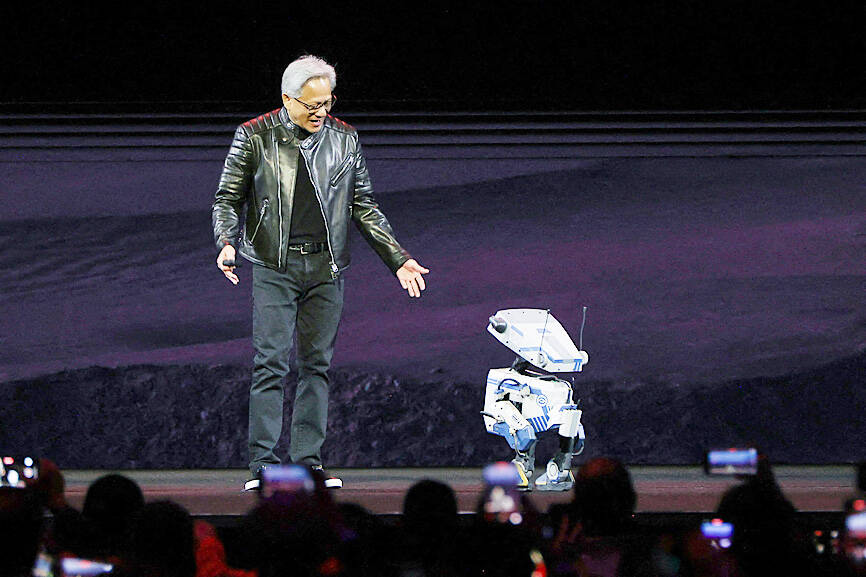Nvidia Corp, the dominant player in chips for artificial intelligence (AI) models, plans to produce as much as US$500 billion of AI infrastructure in the US over the next four years through manufacturing partnerships.
Production of Nvidia’s latest-generation AI chip, known as Blackwell, has begun at the new Taiwan Semiconductor Manufacturing Co (台積電) plant in Phoenix, Arizona, the company said in a statement on Monday.
Nvidia is also building supercomputer manufacturing plants in Texas with Foxconn Technology Group (富士康科技集團), known as Hon Hai Precision Industry Co (鴻海精密) in Taiwan, and Wistron Corp (緯創).

Photo: Reuters
It is also partnering with Amkor Technology Inc and Siliconware Precision Industries Co (矽品精密) for packaging and testing operations in Arizona.
“Adding American manufacturing helps us better meet the incredible and growing demand for AI chips and supercomputers, strengthens our supply chain and boosts our resiliency,” Nvidia chief executive officer Jensen Huang (黃仁勳) said in a statement.
The US$500 billion figure refers to the combined value of all the goods Nvidia anticipates selling in to the supply chain for AI. In large part, the number reflects a commitment from the biggest cloud computing companies to build out and upgrade data centers with the latest equipment.
That group, which includes Microsoft Corp, Amazon.com Inc and Meta Platforms Inc, is expected to spend US$371 billion this year on AI facilities and computing resources, a jump of 44 percent from last year, according to a report published last month by Bloomberg Intelligence.
Nvidia also said the effort would mark the first time that AI supercomputers are produced in the US, a development that US President Donald Trump touted on Monday.
During an appearance at the White House, Trump said that Nvidia made the decision because of tariffs.
“It’s one of the biggest announcements you’ll ever hear — because Nvidia, as you know, controls that almost the entire sector,” he said.
Like other US investment pledges by large US technology companies, Nvidia’s outlay includes plans that were already underway. Still, it represents a win for the president’s agenda, City Index analyst Fiona Cincotta said.
“This is what Trump is aiming for,” Cincotta said on Bloomberg Television. “It is moving that manufacturing back to the US, which is what Trump has pledged.”
Nvidia shares were initially up in the wake of the announcement, before paring the gains. The stock is down 17 percent this year, part of a market rout that has hit technology shares especially hard.
Each Nvidia Blackwell chip costs tens of thousands of US dollars, with servers containing the semiconductors going for millions. Even at those steep prices, US$500 billion of AI hardware would represent a massive quantity of goods — potentially hundreds of thousands of AI-oriented servers.
“Mass production” at the Foxconn and Wistron plants is expected to ramp up in the next 12 to 15 months, Nvidia said in the statement.
Electronics players around the world, including chipmakers, are reeling from shifting new tariff policies from the Trump administration. Over the weekend, Trump pledged he would still apply tariffs to smartphones, computers and popular consumer electronics, downplaying an exemption issued on Friday last week as just a procedural step in his overall push to remake US trade.

AGING: As of last month, people aged 65 or older accounted for 20.06 percent of the total population and the number of couples who got married fell by 18,685 from 2024 Taiwan has surpassed South Korea as the country least willing to have children, with an annual crude birthrate of 4.62 per 1,000 people, Ministry of the Interior data showed yesterday. The nation was previously ranked the second-lowest country in terms of total fertility rate, or the average number of children a woman has in her lifetime. However, South Korea’s fertility rate began to recover from 2023, with total fertility rate rising from 0.72 and estimated to reach 0.82 to 0.85 by last year, and the crude birthrate projected at 6.7 per 1,000 people. Japan’s crude birthrate was projected to fall below six,

Conflict with Taiwan could leave China with “massive economic disruption, catastrophic military losses, significant social unrest, and devastating sanctions,” a US think tank said in a report released on Monday. The German Marshall Fund released a report titled If China Attacks Taiwan: The Consequences for China of “Minor Conflict” and “Major War” Scenarios. The report details the “massive” economic, military, social and international costs to China in the event of a minor conflict or major war with Taiwan, estimating that the Chinese People’s Liberation Army (PLA) could sustain losses of more than half of its active-duty ground forces, including 100,000 troops. Understanding Chinese

US President Donald Trump in an interview with the New York Times published on Thursday said that “it’s up to” Chinese President Xi Jinping (習近平) what China does on Taiwan, but that he would be “very unhappy” with a change in the “status quo.” “He [Xi] considers it to be a part of China, and that’s up to him what he’s going to be doing, but I’ve expressed to him that I would be very unhappy if he did that, and I don’t think he’ll do that. I hope he doesn’t do that,” Trump said. Trump made the comments in the context

SELF-DEFENSE: Tokyo has accelerated its spending goal and its defense minister said the nation needs to discuss whether it should develop nuclear-powered submarines China is ramping up objections to what it sees as Japan’s desire to acquire nuclear weapons, despite Tokyo’s longstanding renunciation of such arms, deepening another fissure in the two neighbors’ increasingly tense ties. In what appears to be a concerted effort, China’s foreign and defense ministries issued statements on Thursday condemning alleged remilitarism efforts by Tokyo. The remarks came as two of the country’s top think tanks jointly issued a 29-page report framing actions by “right-wing forces” in Japan as posing a “serious threat” to world peace. While that report did not define “right-wing forces,” the Chinese Ministry of Foreign Affairs was